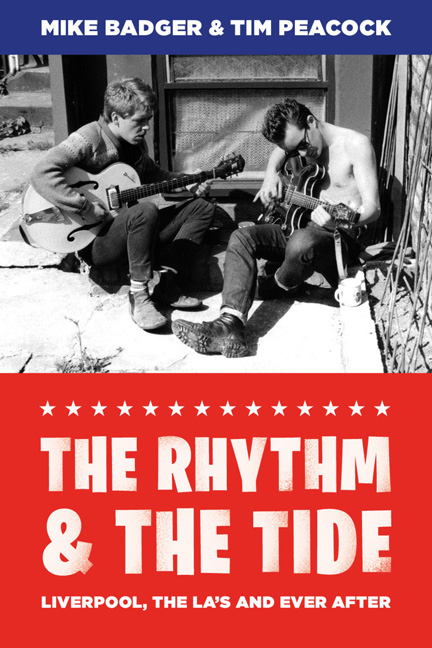Book contents
- Frontmatter
- Contents
- Dedication
- Author's Preface
- 1 Huyton (Two Dogs Fightin' – A Black and a White'n)
- 2 Eric's and Post-Punk Liverpool
- 3 The Smile that You Send Out Returns to You
- 4 The Kindergarten Paint Set
- 5 A Secret Liverpool
- 6 The La's: Breakloose!
- 7 We Have Lift Off!
- 8 The Onset: A New Beginning
- 9 Tumbledown Garage Rock Eclecticism
- 10 Tin Can Alley
- 11 It's a Long Way Back to Germany
- 12 Seeds
- 13 The Pool of Life Revisited
- 14 One Man's Fish is a French Man's Poisson
- 15 Tin Planet
- 16 Lost in Space
- 17 La, a Note to Follow So
- 18 Freedom Now
- 19 Double Zero
- 20 In a Viper Style
- 21 Callin’ All: Lost La's 1986–1987
- 22 Growing Up Is a Killer
- 23 New York State of Mind
- 24 More Unearthing
- 25 Shangri-La
- Roll Call
- Where to See Mike Badger's Art
- Discography
- Art Biography
- Index
- Plate section
12 - Seeds
- Frontmatter
- Contents
- Dedication
- Author's Preface
- 1 Huyton (Two Dogs Fightin' – A Black and a White'n)
- 2 Eric's and Post-Punk Liverpool
- 3 The Smile that You Send Out Returns to You
- 4 The Kindergarten Paint Set
- 5 A Secret Liverpool
- 6 The La's: Breakloose!
- 7 We Have Lift Off!
- 8 The Onset: A New Beginning
- 9 Tumbledown Garage Rock Eclecticism
- 10 Tin Can Alley
- 11 It's a Long Way Back to Germany
- 12 Seeds
- 13 The Pool of Life Revisited
- 14 One Man's Fish is a French Man's Poisson
- 15 Tin Planet
- 16 Lost in Space
- 17 La, a Note to Follow So
- 18 Freedom Now
- 19 Double Zero
- 20 In a Viper Style
- 21 Callin’ All: Lost La's 1986–1987
- 22 Growing Up Is a Killer
- 23 New York State of Mind
- 24 More Unearthing
- 25 Shangri-La
- Roll Call
- Where to See Mike Badger's Art
- Discography
- Art Biography
- Index
- Plate section
Summary
STILL, WE HADN'T DONE too badly in Germany. We'd each come back with £200 from the tour, which enabled me to trade in my Antaria Jazz Star for a black, Johnny Cash-style Fender La Brea acoustic at Hessy's music store. It was time for a change. I liked the new guitar immediately.
The most pressing issue was Simon's departure, so I asked Bernie Nolan if he'd like to join the band on bass. Bernie was an incredibly versatile musician and I always remembered him telling me about how he'd heard rock ‘n’ roll music for the first time. He was just a young kid at a fairground and ‘Jungle Rock’ by Hank Mizell was pumping out from the waltzers. It was an image I'd never been able to forget. Then before we knew it Paul decided to disappear into the woodwork.
Away from the band, I continued to make my tin cars and began branching out into trains, boats, robots and planes. My artistic endeavours had begun to get some recognition, as I did my first exhibition with the ‘Merseyside Unknowns’ at a venue at the back of the Philharmonic Hall in town and it went down great guns. I made more money in a few days than I had ever done with the band. I suppose lots of people in Liverpool were playing guitars but no one was making robots and Cadillacs out of tin cans!
Nonetheless, business continued as usual with The Onset. We played a few gigs before Christmas with Bernie debuting on bass. One was a Greenpeace benefit I had organized at the Liverpool Poly Student Union titled ‘I'm Dreaming of a Green Christmas’. Another one of these shows was with Half Man Half Biscuit at the Leadmill in Sheffield, where I saw Lee's mate Joey Davidson for the first time in ages. He'd had his problems and was on a rehab programme as a result of heroin use. It had been rife in parts of Merseyside during the ’80s, filling the gap for the disillusioned who had no prospects in a society that counted them void of purpose – indeed, you could say in certain parts:
Opiates had become the religion of the people.
- Type
- Chapter
- Information
- The Rhythm and the TideLiverpool, The La's and Ever After, pp. 121 - 129Publisher: Liverpool University PressPrint publication year: 2015



